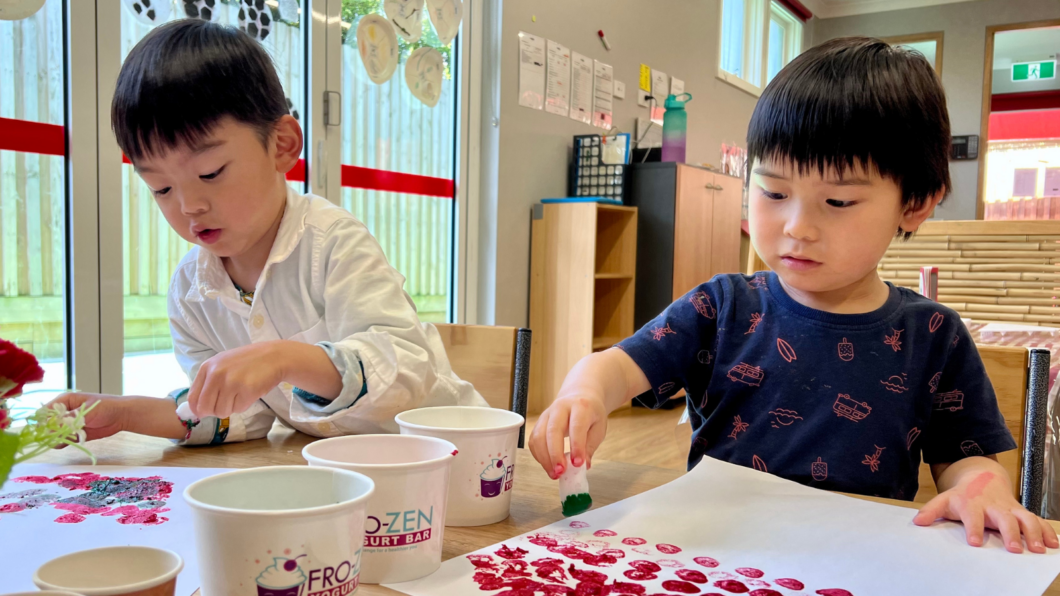What is STEM?
STEM is an acronym for science, technology, engineering, and mathematics. Engaging in STEM based inquiries builds the foundational skills of STEM and prepares children for their future endeavours. With this approach, the children can explore, hypothesise, scrutinise, and investigate the wonders of STEM. This approach to learning allows the children to be active in their own understanding of the world around them.
What will STEM look like?
Children can embark upon a scientific exploration through our educators’ asking questions or it can be facilitated through the experiences that our educators provide. These questions and experiences prompt children to think about what they already know about a particular idea, what they hypothesise might happen and encourage them to alter different variables in the experiment. Your child is basically thinking like a scientist! Although not every child may be interested in the intricacies and complexities of certain STEM concepts, we use the passion that the children express in relation to STEM and thus extend the learning from there.
Importance of STEM?
If we are engaging in STEM during the early years, we can ensure that the children become confident learners who possess solid foundations to build upon. We are wanting to provide the children with the best start to their education. Not only are we preparing the children to be ready for school, but we are also taking into consideration the jobs of the future. Futurists from all over the globe have agreed that our future workforce will require abilities and skills which are often not incorporated into the traditional curriculum. This is why here at Choklits we engage in STEM inquiry learning to develop the child’s creativity, problem-solving, reasoning and collaboration skills, which are all integral components for future career opportunities.
How can you further extend your child’s STEM knowledge?
You do not need to have impeccable science knowledge to be able to engage in this conversation with your child. Nor is there a toolkit that highlights the perfect recipe for a science experiment. A perfect example is being outside on a sunny day with a nice cold drink. You could say “where did the ice go?” Such a questions sparks curiosity and allows the child to ponder where the ice could potentially disappear to. To further extend your child’s knowledge you could place the ice cubes out on different days and see how fast the ice cubes melt. This simple experiment has variables (temperature) that are measurable (the rate at which the ice melts) and is testing a hypothesis. They could yield a simple hypothesis like “when it is hotter the ice cubes melt faster.” No matter where you are STEM is everywhere. If you are having trouble with thinking of activities at home, there is a wonderful resource named ‘Exploring STEM at Home’ which demonstrates just how easily you can incorporate STEM into your child’s life at home. If you are extending this knowledge at home, you are further consolidating their foundational skills which will allow them to be well prepared for the beginning of their learning journey.
What about art?
Although STEM is such an important approach, we must not forget to embrace humanities. Without humanities we are nothing, as it forms the foundations of our communication. Whether we are explaining arbitrary scientific concepts, writing an essay at school, or even conversing with others, humanities have allowed us the ability to execute these tasks. We can be fantastic scientists yielding such elegant results, however, if we are lacking the ability to effectively develop a sophisticated argument, we may be unable to convince others as to why they should invest in our findings. Wherever we may be the ability to develop an argument is important regardless of our position.
At Choklits, we show the children the wonders of art, history, literature, and all other areas governed by humanities. This allows for your child to enter an imaginative world where they can interpret the art or even discuss the characters in the book. Thus, allowing the children to be exposed to different ideas and yield an argument. This lays down the foundation’s requirements.
Written by Cooper Prelorenzo.



